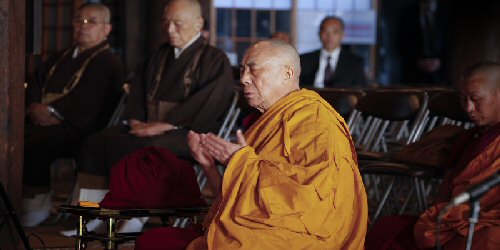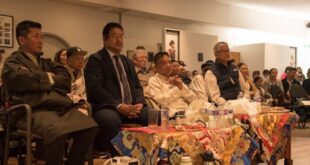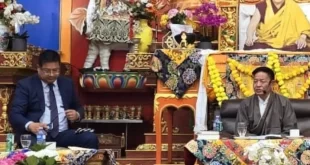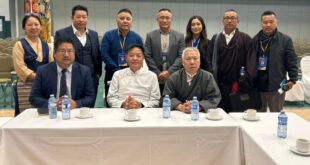Tibet House Japan, April 29, 2011 Friday
TOKYO: His Holiness the Dalai Lama met with Japanese and foreign media this afternoon before presiding over a mass prayer at Gokokuji Temple. His Holiness said that he was deeply saddened that Japan was struck with three cataclysmic natural disasters one after another – earthquake, tsunami and threat from the damaged nuclear plant. Japan being a Buddhist country, images of the Buddhist monasteries and the Japanese friends came before him and he felt sad, he said. “I am happy to have this opportunity to be with the people here and share their sorrow and pray for those who have lost their precious lives.
“But the tragedy has happened; there is no use worrying about it. Just as Japan has overcome the tragedy of World War II, I’m quite sure the people of Japan can overcome this tragedy and move forward to rebuild what has been lost in this disaster. You should not lose heart, you need to face the reality with determination,” His Holiness said.
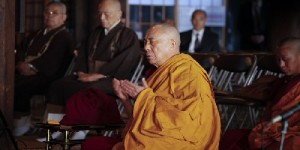
When asked about the situation in Tibet and his decision to devolve his formal responsibilities to the elected Tibetan leadership, His Holiness said he has been committed to democracy and freedom. “Political tsunami has been going on in Tibet. Now these days there is a real danger of Tibetan Buddhist culture being destroyed. Some kind of cultural genocide is going on in Tibet. Media people should go there and investigate and see what is happening there.
“Another aspect of Tibetan problem is ecology. Some Chinese ecologists have said that the high plateau of Tibet is the third pole; global warming effect on Tibetan plateau is as dangerous as that of North and South poles. Major Asian rivers originate from Tibet. Lives of million of people in Asia including China depend on these rivers. This is not a problem of six million Tibetans!” His Holiness said.
Regarding his decision to relinquish formal responsibilities, he said that the world belongs to humanity; it does not belong to religious leaders and governments. “Japan belongs to Japanese people; China belongs to 1.3 billion Chinese, not to the communist party. Since 2001 we have a directly elected leadership and I was in semi-retirement.
Now, after ten years, I see that with maturity of democracy among Tibetans in exile, the day has come to handover the political authority to the people. But this does not mean that I am resigning from being the Dalai Lama.
“Since the inception of the Dalai Lama institution in the 15th century, it was a spiritual institution. It was only from the 5th Dalai Lama onwards that political authority was also assumed by the Dalai Lamas. Now, the Dalai Lama`s role should be purely spiritual, and I voluntarily, proudly and happily end this four-century old leadership” He said.
On Chinese government, His Holiness said that China is the most populated nation with a long rich history and culture. It has become a great economy also. Now, if the People`s Republic of China wants to play more constructive role at international level, trust and respect is very important. Trying to keep everything as State secret and doing away with press freedom is harmful to China in the long run. 1.3 billion Chinese people have the right to know the truth, they also have the ability to judge right from wrong. Distorting information is immoral.
His Holiness appreciated Premier Wen Jiabao`s recent comments including most recently in Malaysia regarding political reform and democracy and said that he fully supports the Premier`s initiatives.
Following the press briefing, His Holiness presided over the mass prayer assembly at the Temple where some over four thousand people have gathered. Mr. Lhakpa Tsohko, Representative at Liaison Office of His Holiness the Dalai Lama for Japan & East Asia made a brief introductory statement on behalf of the organizers.
His Holiness along with the Tibetan monks recited prayers including Sherab Nyingpo (Heart sutra). Later the Japanese monks and the general public recited the Japanese version of the Heart Sutra, (Hangyashingyo).
Ven. Okamoto, Chief Abbot of the Gokokuji Temple expressed his happiness over being able to pray for the victims of the recent disaster with His Holiness. He thanked His Holiness for taking time out to share the grief and sorrow of the people here. Chief Abbot of Tsurumi Sotoshu Temple Ven. Eigawa also thanked His Holiness the Dalai Lama for his prayers and encouragement.
In his public address, His Holiness said that as soon as he heard about the disaster in Japan, he felt a great urge to be with the people to console and share their grief, and that he was very happy to get this opportunity to attend this mass prayer for the people who had lost their lives and those who had lost their dear ones, and those who are displaced. He advised the Japanese people to look forward and not to lose hope. “I am sure you people can do it, you have done this in the past after World War II. Disasters and difficult times teach us many valuable lesson, we need to reflect on these.” His Holiness said.
His Holiness`s words were received by many in tears and joy. Many were seen with folded hands in deep prayers. Many made prostration and many were seen with Khata, Tibetan scarves.
Ven. Hayashi of Japanese Buddhist Association in his concluding remarks thanked His Holiness for his time and said that each time His Holiness visits Japan, people here are greatly inspired and energized. “Prayers have profound effect and energy; we are greatly honored to have His Holiness the Dalai Lama preside over this 49th day of Buddhist formal mourning period. The fact that so many people have gathered will be a great inspiration to the people in the affected regions in particular and the Japanese public in general.” He said.
North-Eastern part of Japan was hit by an earthquake of 9.0 Magnitude on March 11, followed by a strong tsunami which brought great destruction to the lives and properties in the region. As an aftermath of the tragedy, nuclear radiation problem is still disturbing Japan. As of now more than 14,000 people have died, more than 13,000 are still missing and many are displaced.
